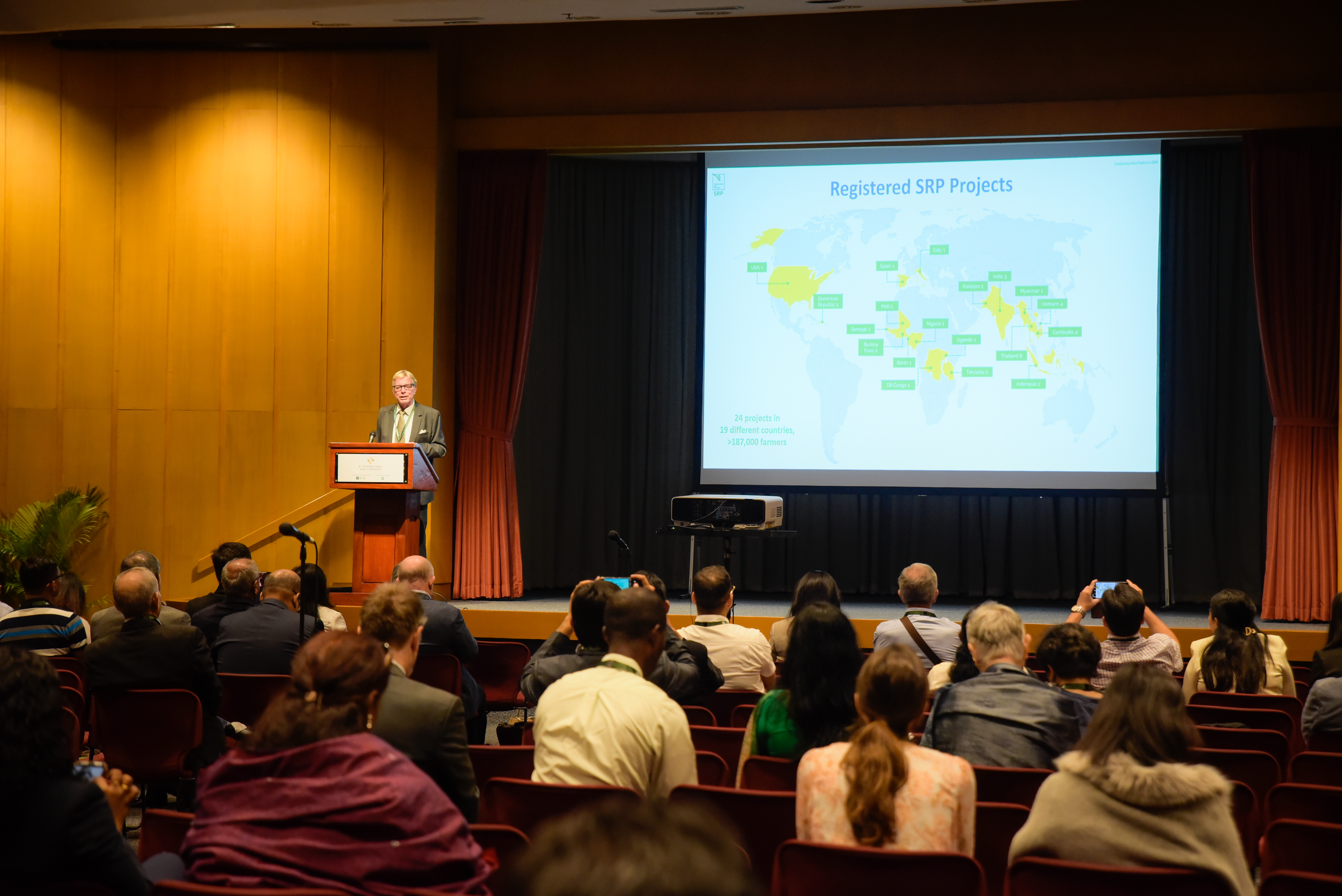Sustainable Rice Platform presents achievements in promoting clean and green rice production for the past 12 years

The Sustainable Rice Platform (SRP) Symposium at the 6th International Rice Congress discussed the accomplishments of SRP, its members, and partners, including the UN Food and Agriculture Organization (FAO), World Business Council for Sustainable Development (WBCSD), Deutsche Gesellschaft für Internationale Zusammenarbeit (GIZ), and national agricultural research and extension systems, over the past 12 years. The event, supported by the Asian Development Bank (ADB), was attended by rice value chain stakeholders from all over the world.
One of the primary roles of SRP is the development and dissemination of the SRP Standard for Sustainable Rice Cultivation. This is the world’s first voluntary sustainability standard for rice cultivation that recommends guidelines for farm management, water use, pest management, nutrient management, harvest and post-harvest practices, and labor practices. SRP recently announced the launch of its Assurance Scheme version 2.0 which updates the verification processes and fees and enhances their data integrity and monitoring.

During the event, outcomes of some of the 24 Registered SRP Projects in 19 different countries were presented which together reached more than 187,000 farmers globally and aimed to promote the adoption of sustainable best practices and provide links to markets.
The event also addressed pertinent issues on sustainability in the rice sector by fostering synergies between market-led and development-driven approaches which are underpinned by a network driven by a common cause.
“Rice supply is expected to drop by nearly 20% due to climate change by 2050”, said SRP Board Chair Keith Jones. “At the same time, production needs to increase by 25% to meet global demand. Because of this, there is an increasing demand for adopting sustainable technologies and practices as production intensifies worldwide.”
Business has an important role in decarbonizing rice value chains by being actively involved in mitigating greenhouse gas (GHG) emissions produced both within their rice value chains, and outside the sector, according to Matthew Reddy, Senior Private Sector Specialist at the Global Environment Facility (GEF). Through blended finance, private and public sector actors can collaborate to enhance climate impact by supporting smallholder farmers through risk-adjusted financial mechanisms, Mr. Reddy said.

There is a skewed distribution of GHG emissions in Asia’s agricultural sector, with flooded rice as one major source, making it a challenge to achieve net zero emissions in the region, according to Dr Takashi Yamano, Principal Economist, and Dr Noriko Sato, Senior Natural Resources Specialist (both at ADB). The SRP Standard can help address this by providing economic incentives to smallholder farmers applying to be SRP-Verified, allowing them to put a premium on their low-carbon emission rice products.
Dr. Yamano elaborated that farmers can earn more by investing in technologies that reduce inputs such as the water-saving alternate wetting and drying technology.
SRP’s Executive Director, Dr Wyn Ellis shared, “Over the coming decade we anticipate that SRP’s current toolbox (including the SRP Standard, Indicators and Assurance Scheme) will be further mainstreamed in support of rice interventions by market actors, governments and the development community. Our aspiration is to see SRP’s efforts contribute to the embedding of sustainable, climate-smart best practices in national sector support policies, bringing about a significant shift in the global food system by reducing the social, environmental and climate footprint of rice production while enhancing its resilience to multiple climate-related impacts.”
Access the presentations during the SRP Symposium here.
About the Sustainable Rice Platform
The Sustainable Rice Platform e.V. (SRP) is a global multi‐stakeholder alliance comprising over 100 institutional members from the public, private, research, civil society, and financial sector. SRP works with its members and partners towards transforming the global rice sector by improving smallholder livelihoods, reducing the social, environmental, and climate footprint of rice production, and by offering the global rice market an assured supply of sustainably produced rice.
SRP promotes resource-use efficiency and climate change resilience in rice systems (both on-farm and throughout value chains) and pursues voluntary market transformation initiatives by developing sustainable production standards, indicators, incentive mechanisms, and outreach mechanisms to boost wide-scale adoption of climate-smart, sustainable best practices among small farmers.
Contact:
Roong Tepkaew, SRP Communications and Membership Manager
Email: roong.tepkaew@sustainablerice.org